The year is starting off with peace and prosperity for Benjamin Ramirez, known far and wide as “the elotero,” the corn and snacks vendor in Los Angeles whose cart was aggressively knocked over by a hostile pedestrian in July 2017.
You know who we’re talking about. Just Google the phrase “elotero cart knocked over” and you’ll get a long list of results; the media coverage made this local story reach a global audience. Now, almost six months later, Ramirez is focused on growing his business and going to the next level with his affordable snacks.
L.A. TACO caught up with Ramirez late last week in between his evening orders. He’d just recovered from being sick for a few days. For the holidays, his family made tamales — three different kinds, including rajas con queso — and they planned on eating some more to celebrate the New Year.
“I’m blessed, thank God,” Ramirez told me. “Everything has been calm. I’m just here working, as usual.”
He’s back on the same street corner where the incident took place — near N. El Centro Avenue and Romaine Street in Hollywood, not far from Santa Monica Boulevard — and still has a loyal clientele most afternoons between 3 and 6 pm. In the evenings, he stays home. On the day I visited, one woman remarked nearby that she knows of another elotero not too far away, but that she prefers the elotes Ramirez sells.
The love for Ramirez’s corn in L.A. came about after his mother Imelda posted a video on July 24 with this caption (in all caps): “Que opinan que existan personas como este tipo destruyendo su carrito de raspados, elotes, esquites a mi hijo Benjamin, quien se gana la vida trabajando honradamente.” [Roughly: “What do you think that this sort of person exists? Who would knock over a cart of raspados, elotes, esquites, belonging to my my son Benjamin, who makes a living working honorably?”]
Go ahead and watch it again (the attacker turned out to be from Argentina):
The video shows a couple with a dog arguing with a street vendor: Benjamin Ramirez, son of Imelda. At 0:35, the man in the video walks towards Ramirez and knocks over the vendor’s cart in a fit of rage. The video has had nearly 9 million views to date.
For many Angelenos, the incident involving Ramirez’s flipped-over carrito felt like an attack on the broader community and all the street vendors trying to make ends meet. It also came just months after the L.A. City Council voted to decriminalize street vending. Although that vote helped alleviate some fears of deportation by street vendors, many of them are now hoping for official permits, which have still not been formalized.
The viral story of Ramirez’s ruined cart set off a wave of support for him online from a variety of people. In July, artist Lalo Alcaraz shared a Facebook status stating that he would donate half the proceeds of the sale of his “Elote Justice” prints to Ramirez.
Other shows of support included a GoFundMe campaign, a happy hour fundraising event at Indie Brewing Company, and a rally in Hollywood to support street vendor legalization. In August, the California Hispanic Chambers gave Ramirez a special recognition.
When the attack took place, Ramirez had only been at his corner for about two months. He arrived in Los Angeles a year-and-a-half ago from Mexico.

In early September, journalist Aura Bogado reported that Ramirez had received a new custom cart thanks to the efforts of Jay Pee of bike club Los Ryderz. The group reached out via Facebook to let the family know that they wanted to donate a new cart. All they asked for was measurements, said Ramirez. Bogado captured photographs of the entire design process, along with Los Bandoleros Bike Club’s Carlos Molina and welder Art Ramirez, who delivered the cart (see above) to the elotero’s home.
‘I want to start with something more financially feasible and add to the items I offer.’
Unfortunately, because L.A.’s street vendor regulations haven’t been fully published or implemented, Benjamin hasn’t been using his fresh cart for fear of it still getting confiscated. “They gave me a cart but I’m storing it right now,” Ramirez said. “It has a connection for a cellphone and for lights.”
When L.A. TACO visited him, the cart he was using that afternoon looked much simpler — save for the festive Christmas lights around the edge of the umbrella. The tricked-out cart from Los Ryderz is safe and sound elsewhere.
“Since I don’t have a permit right now, I thought ‘What if they take it?’” Ramirez said. “It’s better that I leave it stored and use this one. ... I don’t think they’re going to gift me another one just like that.”
Ramirez said he’s working with a lawyer toward obtaining a U-Visa in 2018.
“I wanted to get a brick-and-mortar location, but first I need to start with adding more things,” Ramirez said. “Trying to start un local ... I don’t have enough money. I want to start with something more financially feasible and add to the items I offer.”
His drive started at a young age: Ramirez began selling what he could as a kid, like empanadas and bread, to make ends meet. Benjamin worked as a dishwasher when he first arrived in L.A., but soon decided to pursue his own venture.
Words played a vital role in spurring hate crimes this year, with an administration that propagated negative stereotypes about many communities. A recent FBI report found that hate crimes in 2016 had increased nationally by five percent.
Los Angeles in particular saw a 12.6 percent increase in hate crimes “in the first half of 2017,” due in large part to “more polarized politics and protests,” according to the Los Angeles Times.
A wave of response to a viral video itself doesn’t mean change. But strangers came together for Ramirez both online and offline, in a sign that positive steps are possible, when something spurs it. Now, Ramirez buys food from other local vendors, many of whom recognize him. He even gets people stopping him at the Costco where he shops for supplies.
He’s the man they saw in that video, Benjamin told me. The guy who got knocked down, got support from the community, and kept on going.
* Parts of this interview were translated from Spanish.







